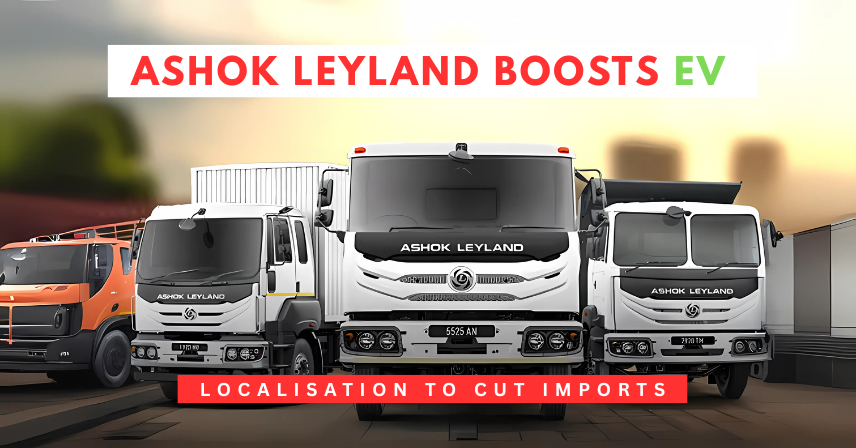Ashok Leyland plans to accelerate localisation of EV components to reduce import dependency. Learn about its EV strategy, policies, and future roadmap.
India’s commercial vehicle sector is undergoing a massive transformation, with electric mobility taking center stage. Among the key players, Ashok Leyland, the flagship company of the Hinduja Group, is making bold moves to strengthen its localisation strategy for electric vehicles (EVs). The company’s focus is clear: reduce dependency on imported components and build a strong domestic EV supply chain.
With India pushing for self-reliance under the “Atmanirbhar Bharat” initiative, localisation of EV parts—such as batteries, motors, controllers, and power electronics—has become critical. Ashok Leyland’s accelerated efforts to localise not only aim to derisk its EV portfolio from global supply disruptions but also to ensure cost competitiveness in a rapidly growing market.
Why Localisation is Critical for Ashok Leyland’s EV Strategy
- Import Dependency Challenge
At present, India’s EV ecosystem relies heavily on imported cells, rare earth magnets, semiconductors, and power electronics. This makes EV manufacturing vulnerable to global supply chain disruptions and fluctuating international prices. - Rising Demand for Commercial EVs
With government policies, incentives, and fleet electrification, the demand for electric buses, trucks, and LCVs (Light Commercial Vehicles) is rising. Ashok Leyland wants to position itself as a market leader by ensuring timely and cost-efficient supply. - National Push for Atmanirbhar Bharat
The Government of India has already announced Production Linked Incentive (PLI) schemes for Advanced Chemistry Cell (ACC) batteries and auto components. Ashok Leyland aims to leverage these policies for domestic manufacturing partnerships.
Ashok Leyland’s Localisation Roadmap
Ashok Leyland has adopted a three-pronged strategy for EV localisation:
1. Battery and Cell Manufacturing Partnerships
- Exploring tie-ups with domestic battery makers for localised cell production.
- Plans to set up assembly lines for battery packs within India to cut costs.
- Investing in battery recycling and second-life applications for sustainability.
2. Localising Motors and Power Electronics
- Developing indigenous e-motors and controllers to replace imported alternatives.
- Strengthening its R&D base in Chennai to design power electronics suitable for Indian driving conditions.
- Collaborating with Indian suppliers and startups for innovation in EV parts.
3. Building an EV Supply Chain Ecosystem
- Creating long-term partnerships with Tier-1 and Tier-2 component suppliers.
- Focusing on charging infrastructure with smart, locally manufactured chargers.
Supporting SMEs and MSMEs to boost the local ecosystem for EV production.
Government Policies Driving Localisation
India’s EV transition is being supported by strong policy measures:
- FAME II Scheme (Faster Adoption and Manufacturing of Electric Vehicles): Offers subsidies for electric buses and commercial vehicles.
- PLI Scheme for ACC Batteries: Incentivises domestic manufacturing of advanced batteries.
- Custom Duty Benefits: Promotes use of locally sourced components.
- State EV Policies: States like Tamil Nadu, Karnataka, and Maharashtra are creating EV clusters with tax benefits and subsidies.
Ashok Leyland is aligning its localisation strategy to take maximum advantage of these government initiatives.
Competitive Edge Through Localisation
By localising its EV components, Ashok Leyland aims to:
- Reduce Production Costs – Local sourcing avoids import duties and shipping costs.
- Mitigate Supply Chain Risks – Less exposure to global shortages of chips and raw materials.
- Boost Reliability – Locally developed parts tailored for Indian roads and weather conditions.
- Accelerate Product Launches – Faster time-to-market with in-house manufacturing.
- Support Sustainability Goals – Lower carbon footprint by reducing international logistics.
This competitive edge will enable Ashok Leyland to deliver cost-effective EVs to fleet operators and government transport undertakings.
The EV Portfolio of Ashok Leyland
Ashok Leyland has already made notable progress in the EV space through its subsidiary Switch Mobility.
- Electric Buses: Operating in multiple cities under state transport undertakings.
- Electric Trucks & LCVs: Focused on intra-city logistics and last-mile delivery.
- New Product Pipeline: Upcoming launches in the medium and heavy commercial vehicle (MHCV) segment.
By boosting localisation, the company aims to make these EVs affordable, reliable, and widely scalable.
Industry Outlook: The Future of Localised EVs in India
Industry experts believe that India’s localisation journey for EVs will unfold in stages:
- Short Term (2025–2027): Battery pack assembly, chargers, and wiring harness localisation.
- Medium Term (2028–2030): Cell manufacturing and semiconductor ecosystem development.
- Long Term (Post-2030): Full localisation of advanced components including fuel cells and hydrogen technologies.
Ashok Leyland’s early push for localisation ensures it stays ahead in the curve and becomes a dominant force in India’s EV commercial vehicle market.
Challenges in Localisation
Despite its ambitious roadmap, Ashok Leyland will face some challenges:
- High Initial Investment – Setting up local plants requires significant capital.
- Technology Gaps – India still lags in advanced cell chemistry and semiconductor design.
- Supplier Readiness – Small-scale suppliers may need upskilling and quality upgrades.
- Global Competition – China and Korea still dominate the global EV supply chain.
However, with strategic partnerships and government support, these challenges can be gradually overcome.
Conclusion
Ashok Leyland’s decision to accelerate localisation of electric vehicle components marks a significant step towards building a self-reliant EV ecosystem in India. By reducing dependency on imports, the company is not only safeguarding its supply chain but also ensuring cost competitiveness, sustainability, and long-term growth.
With a robust EV portfolio, government support, and rising market demand, Ashok Leyland is well-positioned to become a pioneer in India’s commercial EV segment.
For more updates like this, visit www.commercialbhp.com

